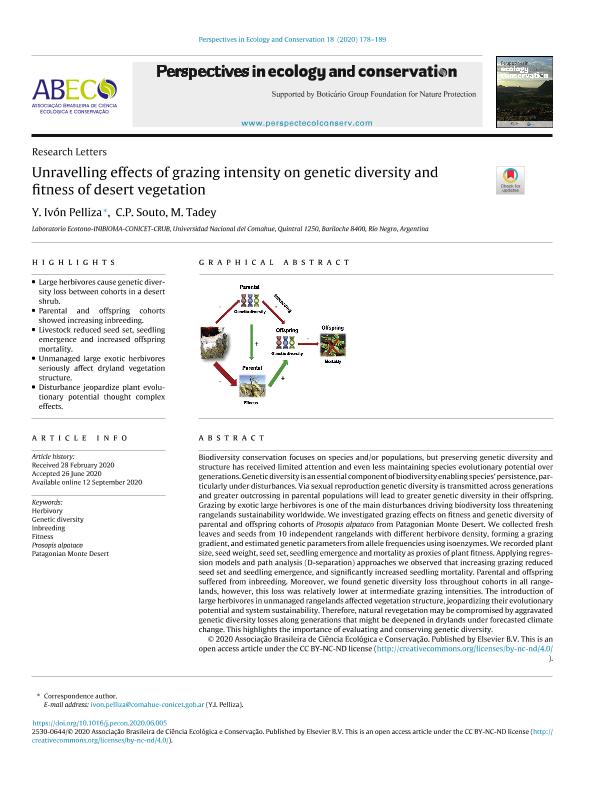Mostrar el registro sencillo del ítem
dc.contributor.author
Pelliza, Yamila Ivón

dc.contributor.author
Souto, Cintia Paola

dc.contributor.author
Tadey, Mariana

dc.date.available
2022-11-11T16:34:07Z
dc.date.issued
2020-07
dc.identifier.citation
Pelliza, Yamila Ivón; Souto, Cintia Paola; Tadey, Mariana; Unravelling effects of grazing intensity on genetic diversity and fitness of desert vegetation; Elsevier; Perspectives in Ecology and Conservation; 18; 3; 7-2020; 178-189
dc.identifier.issn
2530-0644
dc.identifier.uri
http://hdl.handle.net/11336/177511
dc.description.abstract
Biodiversity conservation focuses on species and/or populations, but preserving genetic diversity and structure has received limited attention and even less maintaining species evolutionary potential over generations. Genetic diversity is an essential component of biodiversity enabling species’ persistence, particularly under disturbances. Via sexual reproduction genetic diversity is transmitted across generations and greater outcrossing in parental populations will lead to greater genetic diversity in their offspring. Grazing by exotic large herbivores is one of the main disturbances driving biodiversity loss threatening rangelands sustainability worldwide. We investigated grazing effects on fitness and genetic diversity of parental and offspring cohorts of Prosopis alpataco from Patagonian Monte Desert. We collected fresh leaves and seeds from 10 independent rangelands with different herbivore density, forming a grazing gradient, and estimated genetic parameters from allele frequencies using isoenzymes. We recorded plant size, seed weight, seed set, seedling emergence and mortality as proxies of plant fitness. Applying regression models and path analysis (D-separation) approaches we observed that increasing grazing reduced seed set and seedling emergence, and significantly increased seedling mortality. Parental and offspring suffered from inbreeding. Moreover, we found genetic diversity loss throughout cohorts in all rangelands, however, this loss was relatively lower at intermediate grazing intensities. The introduction of large herbivores in unmanaged rangelands affected vegetation structure, jeopardizing their evolutionary potential and system sustainability. Therefore, natural revegetation may be compromised by aggravated genetic diversity losses along generations that might be deepened in drylands under forecasted climate change. This highlights the importance of evaluating and conserving genetic diversity.
dc.format
application/pdf
dc.language.iso
eng
dc.publisher
Elsevier

dc.rights
info:eu-repo/semantics/openAccess
dc.rights.uri
https://creativecommons.org/licenses/by-nc-nd/2.5/ar/
dc.subject
FITNESS
dc.subject
GENETIC DIVERSITY
dc.subject
HERBIVORY
dc.subject
INBREEDING
dc.subject
PATAGONIAN MONTE DESERT
dc.subject
PROSOPIS ALPATACO
dc.subject.classification
Genética y Herencia

dc.subject.classification
Ciencias Biológicas

dc.subject.classification
CIENCIAS NATURALES Y EXACTAS

dc.title
Unravelling effects of grazing intensity on genetic diversity and fitness of desert vegetation
dc.type
info:eu-repo/semantics/article
dc.type
info:ar-repo/semantics/artículo
dc.type
info:eu-repo/semantics/publishedVersion
dc.date.updated
2021-11-17T14:42:47Z
dc.journal.volume
18
dc.journal.number
3
dc.journal.pagination
178-189
dc.journal.pais
Brasil

dc.description.fil
Fil: Pelliza, Yamila Ivón. Consejo Nacional de Investigaciones Científicas y Técnicas. Centro Científico Tecnológico Conicet - Patagonia Norte. Instituto de Investigaciones en Biodiversidad y Medioambiente. Universidad Nacional del Comahue. Centro Regional Universidad Bariloche. Instituto de Investigaciones en Biodiversidad y Medioambiente; Argentina
dc.description.fil
Fil: Souto, Cintia Paola. Consejo Nacional de Investigaciones Científicas y Técnicas. Centro Científico Tecnológico Conicet - Patagonia Norte. Instituto de Investigaciones en Biodiversidad y Medioambiente. Universidad Nacional del Comahue. Centro Regional Universidad Bariloche. Instituto de Investigaciones en Biodiversidad y Medioambiente; Argentina
dc.description.fil
Fil: Tadey, Mariana. Consejo Nacional de Investigaciones Científicas y Técnicas. Centro Científico Tecnológico Conicet - Patagonia Norte. Instituto de Investigaciones en Biodiversidad y Medioambiente. Universidad Nacional del Comahue. Centro Regional Universidad Bariloche. Instituto de Investigaciones en Biodiversidad y Medioambiente; Argentina
dc.journal.title
Perspectives in Ecology and Conservation
dc.relation.alternativeid
info:eu-repo/semantics/altIdentifier/doi/http://dx.doi.org/10.1016/j.pecon.2020.06.005
dc.relation.alternativeid
info:eu-repo/semantics/altIdentifier/url/https://www.sciencedirect.com/science/article/pii/S2530064420300390
Archivos asociados
